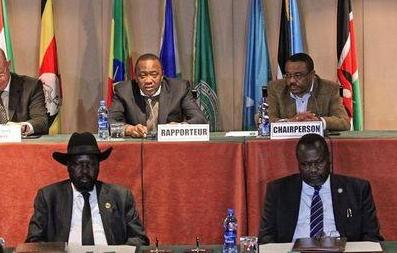South Sudan rejects new IGAD power sharing proposal with rebels
June 13, 2015 (JUBA) – South Sudanese government has rejected a peace proposal by the Intergovernmental Authority on Development (IGAD), an East African regional bloc mediating peace talks aimed at bridging gaps between rival warring parties and end the 18-month civil war in the young nation.

“This IGAD proposal is not the right approach to resolving the conflict. It does not represent the interest of the people of South Sudan. It encourages awarding rebellion and division of our people,” deputy minister Gbandi told Sudan Tribune on Saturday.
“The people of Upper Nile do not want this country to be divided. Majority of them are with the government and that is why majority of those fighting the rebellion in the states of Upper Nile are sons and daughters of Upper Nile region because they believe that the objectives of this rebellion are not clear,” he claimed.
President Salva Kiir’s spokesperson, Ateny Wek Ateny, in a separate interview told reporters on Friday that the government was not ready to accept a peace agreement that would divide the country and its people by rewarding the armed opposition leadership.
Lieutenant General Bapiny Monytuil, a government allied militia commander, whose forces fight alongside the government forces against the armed opposition fighters after he abandoned rebellion in 2012 in response to presidential amnesty, also told Sudan Tribune on Saturday that the regional proposal added more fuel to the conflict instead of addressing it.
“Where are the rebels of Riek Machar now? Why give them 53 percent of power sharing? What is the logic? They are not [in] Unity state, not in strategic places in Upper Nile and Jonglei states. So why give them this percentage,” inquired General Monytuil during an exclusive interview with Sudan Tribune on Saturday.
General Monytuil, a brother to the pro-government Unity state’s governor, Joseph Monytuil, is the one whose forces under the command of the militia commander Matthews Puljang, do much of the fighting in the oil-rich Unity state to defend it on behalf of president Kiir’s government.
The powerful militia commander in the area threatened to continue the fight with his own war if the government accepted the regional proposal and gave Machar’s opposition group power to administer the three states of Upper Nile region which has been the epicenter of the armed confrontation between the government forces and rebel fighters.
“We will not accept this proposal as a solution to the conflict even if it means fighting for hundred years. Why will I surrender the area under my control to someone who has lost the control? There is no logic here,” the pro-government militia commander, also from Nuer ethnic group like Machar, further declared.
He further claimed that his forces had flushed out the rebels from Unity state and they were also in discussions with Sudanese armed forces to implement the 2012 cooperation agreement which, he said, required the two countries to not allow any hostile group to use and operate in the territory under the control of the other.
Gordon Buay, former spokesperson of the militia group now fighting for the government also told Sudan Tribune that the IGAD proposal was not the right approach to resolving the conflict.
“First of all, the rebels of Riek Machar do not hold any significant territory. They have lost all the areas in Unity state and only holding out in small areas in Upper Nile and Jonglei states. They are only in some parts of Jonglei state, especially in Akobo and Pagak in Upper Nile state, which are insignificant,” Buay claimed.
He said had it not been for the government’s commitment to the peace process, the rebels would have been dislodged from those two remaining areas under their control.
“They are there not because the government is not capable of taking control of these areas but because the government is committed to peaceful settlement of the conflict but if this is what the IGAD see as the basis of their strengths to be given this percentage, then they are wrong,” further claimed the previously strong anti-Kiir militia official who once called for removal of the president until he switched sides after independence.
Buay proposed that IGAD should only give the rebels 15% in the power-sharing in greater Upper Nile region for the “sake of accommodation”, warning that others will continue to fight in the region if the rebels were put in control of the richest part of the country.
(ST)
